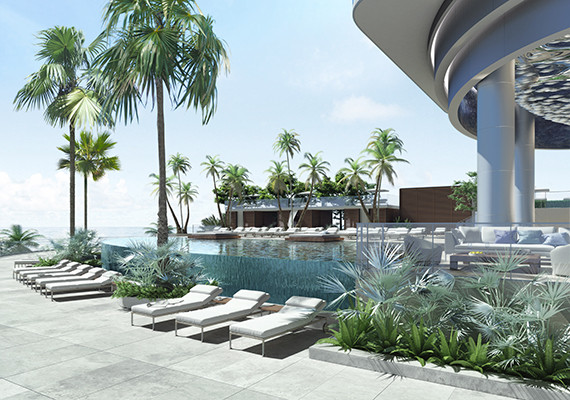He’s the American Dream personified: A Panamanian who started out on a landscaping crew digging, and now, has his own landscape architecture firm employing 10 people in Miami Beach, Palm Beach and Southampton and designing grounds for Four Seasons resorts.
Fernando Wong trained as an architect and graduated as an interior designer in his homeland before moving to Florida in 2001. The grandson of a Chinese immigrant, he always loved to draw. When supervisors in Florida saw him drawing at landscaping sites, they moved him up the ranks. By the time he turned 30, after teaching himself English watching South Park and other TV shows, Wong was ready to launch his own business.
Now, the team at Fernando Wong Outdoor Living Design is busy on Four Seasons projects in Miami Beach, Fort Lauderdale and Palm Beach. They’re also working on the Institute of Contemporary Art in Miami’s Design District and a tourist destination in Nassau, Bahamas to be called the Retreat Garden, among other projects across North America.
The Real Deal spoke with Wong, 41, and partner Tim Johnson, 50, at their Miami Beach office overlooking the Atlantic Ocean and Biscayne Bay. The interview has been edited for clarity and space.
What distinguishes you in landscape architecture?
Fernando: I don’t have a style. I draw inspiration from the architecture and setting of a house. The design is addressed to maximize views while obscuring undesirable vistas.
Tim: Fernando uses classic architectural principles: scale, proportion, layering and mathematical formulas. It’s about straight lines and view corridors. What he’s not known for is amoeba shapes or free-form landscapes.
When did your first big break come?
Fernando: With a real estate agent. He wanted to remove a pool in the front yard. I convinced him not to spend the money on demo[lition], because I could incorporate that pool as a garden element, and he could save that money for a pool in the backyard.
Tim: Later, there was an article in Luxe Magazine, and an interior designer saw it. They had a project on the ocean for someone who owned a sports team, and because of that, we got other projects in Palm Beach. We opened an office there about three years ago, and with so many people from Palm Beach in Southampton, we opened there in the past year.
Do you specialize in certain kinds of projects?
Tim: We do lots of large residences on the water. We also have a reputation for coming in and turning condominiums around. We take condos built 10 to 20 years ago and give them a very modern, clean, resort look.
What would be your average project price?
Tim: For residential projects, design fees are $50,000 to $150,000 and up. Design fees for commercial projects start at $250,000. Total costs for most projects are seven figures.
What is your vision for The Surf Club Four Seasons, the renovated 1920s resort in Surfside where Winston Churchill, royalty and movie stars once stayed?

Rendering of the Four Seasons Fort Lauderdale
Fernando: We’re fortunate to be working with architect Richard Meier. One challenge was that the pool area sits low and doesn’t allow you to see the ocean. So, my concept was “Let’s have a grove of coconuts.” I thought of the estates in Palm Beach that have perfectly manicured lawns and a grove of palms hovering over the lawn – open spaces that incorporate the dunes and sea oats between the property and the water.
So, we created a series of berms [contoured topography] and terraces as platforms of lawn, with a grid of palms. Near the existing dunes, it was barren. So, we added canopy trees and created view corridors with sea grapes and coconuts as well as sea oats, which are good to hold the sand when we get storms. I think it’s the ultimate luxury to perceive that you have open land.
And how are you approaching the Four Seasons Fort Lauderdale?
Fernando: We’re collaborating with architect Kobi Karp and two interior designers from London, Tara Bernard and Martin Brudnizki. The building is elevated from the sidewalk to block the road that runs between it and the beach, with curvilinear walls that outline part of the property. We kept the grove idea in one corner and a tree overhang above a restaurant. We’re also going to incorporate lower canopy trees hovering over the walls and ground cover to give transparency and a little privacy from the road, again without losing the views.
What differentiates landscape architecture in South Florida?
Fernando: It’s very cosmopolitan and sophisticated. The weather also allows us to be very fluid; we can be Mediterranean or tropical.
Tim: We’re blessed we can plant year-round here. When we do projects in places like New Orleans, Virginia or Savannah, you’re limited by the plant material there and by the growing seasons.
What trends do you see in landscape architecture in South Florida?
Fernando: There is a higher awareness from our clients to preserve the dunes and use native plant material. At the Four Seasons projects, the developers and owners believe in beautiful signature trees. For the Surf Club, we brought in a Florida ficus aurea 70-feet tall. We cut it vertically in five pieces, loaded it on the back of five trucks, put it back together with a crane, basically taped it up, and the pieces grew together very well.
Tim: We’re also seeing landscape architects get equal billing with architects and interior designers. Landscape design was kind of an afterthought. Now, people demand luxury properties lush like resorts. So, developers are creating teams with the architect, interior designer and landscape architect all teed up and working together. It’s a great trend, because it makes for a much more successful project.
